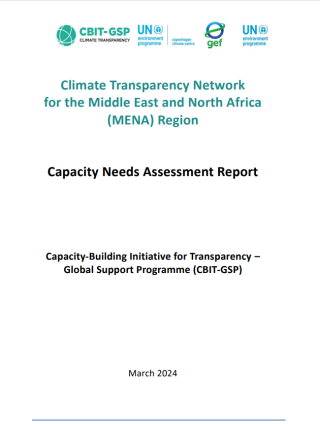The Capacity Needs Assessment Report (CNAR) captures the results of the Capacity Needs Assessment that was carried out to evaluate the status quo of the transparency systems and related capacities of MENA Regional Network countries to comply with the reporting requirements of the UNFCCC and the Paris Agreement. The assessment was done through an online survey conducted from January 24th to February 29th, 2024. The assessment garnered responses from 14 out of the 18 countries within the MENA regional network. These are: Algeria, Morocco, Tunisia, Mauritania and Libya, from North Africa, and Bahrain, Iraq, Kuwait, Egypt, Sudan, Lebanon, Jordan, Somalia and Yemen, from the Middle East.
In this survey, a comprehensive set of targeted questions were asked focusing on the principal five key areas of climate transparency, notably on, Greenhouse Gas (GHG) Inventory, NDCs Tracking, Adaptation efforts, Loss and Damage, Support Needed and Received and Gender Mainstreaming. Furthermore, the survey examined the institutional arrangements for the Enhanced Transparency Framework (ETF) and the Measurement, Reporting, and Verification (MRV) systems implemented in the region. Additionally, the questionnaire also explored the different reporting documents submitted to the UNFCCC notably the Biennial Transparency Report (BTR). The survey also assessed the primary financial and technical support that countries have utilized to enhance their climate transparency and reporting frameworks.
Therefore, this report provides an analysis of the capacity needs in the region, summarising the main findings based on feedback from countries. The respondents mainly represented governmental organisations responsible for coordinating climate reporting and transparency actions. Additionally, the report recommends three primary priorities for capacity-building needs in these countries, which will serve as crucial input for preparing the 2024 Regional Network Work Plan.
